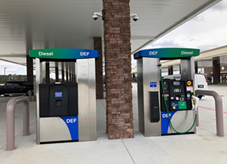The Guardian Technologies Advantage: Steps to Becoming a Valued Customer
January 24, 2024
How to Reduce Fleet Fuel Costs
February 20, 2024Efficient and effective management of fuel resources is essential to attaining industrial operational excellence. The fuel industry plays a pivotal role in ensuring that commercial and industrial enterprises have access to a reliable and consistent supply of fuel to power their machinery, vehicles, and equipment. As a leading provider of commercial fuels solutions, Guardian Fueling Technologies is well aware of the crucial role that proper fuel management plays in the success of industrial operations. In this article, we will delve further into the significance of efficient fuel management, examining its multifaceted impact on various aspects of industrial processes and the indispensable role played by Guardian Fueling Technologies in this vital sector.
Understanding the Fuel Industry
Before we explore the intricacies of proper fuel management, it is essential to grasp the fundamental workings of the fuel industry. The fuel industry encompasses the exploration, production, distribution, and consumption of various types of fuels, including gasoline, diesel, natural gas, and biofuels. These fuels serve as the lifeblood of countless industrial and commercial fueling activities, powering a wide range of machinery, vehicles, generators, and more.
The Role of Commercial Fuel Solutions
Guardian Fueling Technologies stands at the forefront of the fuel industry, specializing in the provision of commercial fuels solutions to businesses of all sizes. Our expertise lies in ensuring that industrial operations have access to a consistent and reliable supply of fuel, regardless of their size or complexity. We take pride in offering end-to-end solutions that encompass planning, execution, and maintenance, all while staying within budget and adhering to strict timelines.
The Significance of Proper Fuel Management
Efficient fuel management is paramount for industrial operations for a variety of compelling reasons. It profoundly influences various aspects of business operations, including cost control, sustainability, safety, and overall productivity.
Cost Control and Efficiency
One of the most immediate and significant impacts of proper fuel management is cost control. Inefficient fuel usage can lead to excessive expenses and exert considerable pressure on a company’s financial resources. By carefully managing fuel consumption, companies can significantly reduce operational costs, ultimately bolstering their profitability.
Fuel Efficiency Strategies
- Optimizing Routes: This involves the implementation of systems and practices aimed at maximizing the efficiency of vehicle routes. The goal is to minimize unnecessary mileage, ultimately leading to reduced fuel consumption.
- Regular Maintenance: Ensuring that vehicles and equipment undergo consistent and thorough maintenance is crucial. This not only helps in achieving optimal fuel efficiency but also extends the operational life of the equipment.
- Adopting Advanced Technologies: Exploring and integrating emerging fuel-saving technologies can significantly impact industrial operations. By staying abreast of the latest innovations, businesses can identify and implement solutions that contribute to enhanced fuel efficiency in their operations.
Sustainability and Environmental Responsibility
In an era of growing global environmental awareness, industrial operations are under increasing pressure to adopt sustainable practices. Proper fuel management provides companies with the means to minimize their environmental impact, reduce emissions, and transition to cleaner fuels where feasible.
Transitioning to Clean Fuels
1. Biofuel and Carbon Footprint Reduction:
- Definition: Biofuels are derived from organic materials, such as plants and waste, and are considered a renewable energy source.
- Potential Impact: Biofuels have the potential to significantly reduce the carbon footprint of industrial operations. When compared to traditional fossil fuels, biofuels generally emit fewer greenhouse gases, contributing to a more sustainable and environmentally friendly industrial landscape.
- Implementation: Industries can transition to biofuels by incorporating them into their energy mix, be it in the form of biodiesel, bioethanol, or other bio-based fuels. This shift supports a more eco-friendly approach while maintaining operational functionality.
2. Hydrogen as a Clean Fuel Source:
- Overview: Hydrogen is a versatile and clean fuel source that can be produced through various methods, including electrolysis and steam methane reforming.
- Potential Benefits: – Low Emissions: Hydrogen combustion produces water vapor as the primary emission, contributing to minimal environmental impact. – Versatility: Hydrogen can be used in various industrial processes, from powering vehicles to serving as a feedstock in manufacturing. – Renewable Production: When produced using renewable energy sources, hydrogen becomes a truly sustainable fuel option.
- Challenges: – Production Costs: Current methods of hydrogen production can be energy-intensive and expensive. – Infrastructure: Developing a robust hydrogen infrastructure for storage, transportation, and distribution poses challenges. – Energy Density: Hydrogen has a lower energy density compared to some traditional fuels, necessitating advanced storage and transportation solutions.
3. Electric Vehicles in Industrial Operations:
- Transformation of Transportation: The integration of electric vehicles (EVs) in industrial operations represents a transformative shift from conventional combustion engine vehicles to those powered by electricity.
- Carbon Footprint Reduction: EVs contribute to a reduction in the carbon footprint of industrial fleets. By relying on electricity, often derived from cleaner sources, these vehicles emit fewer pollutants during operation.
- Benefits: – Cost Savings: Over time, the total cost of ownership for EVs can be lower than that of traditional vehicles due to lower maintenance costs and potentially lower energy costs. – Regulatory Compliance: Adapting to electric vehicles aligns with evolving environmental regulations and sustainability goals.
- Considerations: – Charging Infrastructure: Establishing a comprehensive charging infrastructure is essential for the widespread adoption of electric vehicles in industrial settings. – Range Limitations: While battery technology is advancing, some electric vehicles may have range limitations, requiring careful planning for longer journeys. – Initial Investment: The upfront cost of electric vehicles and associated infrastructure may be higher, requiring initial capital investment.
Safety and Reliability
Safety is paramount in industrial operations, and proper fuel management plays a crucial role in ensuring that fuel-related accidents are minimized. Well-maintained equipment, safe fuel storage practices, and strict adherence to safety regulations are all integral components of effective fuel management.
Fuel Storage Safety
1. Fuel Storage Regulations and Compliance:
- Overview: Fuel storage regulations are guidelines and standards that dictate the safe storage of fuels in industrial settings. Compliance is crucial for ensuring the safety of personnel, preventing environmental hazards, and meeting legal requirements.
- Importance of Adherence: Adhering to fuel storage regulations is paramount for industrial facilities. This involves proper storage tank construction, location considerations, spill containment measures, and regular inspections to identify and address potential hazards.
- Regulatory Agencies: Different regions may have specific regulatory agencies that set and enforce fuel storage standards. Compliance with these regulations demonstrates a commitment to safety and environmental responsibility.
2. Emergency Preparedness Strategies:
- Business Continuity: Fuel-related emergencies, such as leaks, spills, or shortages, can disrupt operations. Emergency preparedness strategies are essential to ensure business continuity by having contingency plans.
- Backup Fuel Supply Options: Maintaining backup fuel supplies is a critical aspect of emergency preparedness. This involves readily available secondary fuel sources to prevent disruptions in primary fuel supply issues.
- Contingency Planning: Creating comprehensive contingency plans includes identifying potential fuel-related risks, outlining response procedures, and establishing communication protocols. Regular drills and training sessions ensure that personnel are well-prepared to handle emergencies.
3. Fuel Management Software: Enhancing Safety Through Digital Solutions:
- Role of Digital Solutions: Fuel management software plays a pivotal role in modern industrial operations by leveraging digital solutions to monitor fuel storage and consumption efficiently.
- Monitoring Fuel Levels: Digital solutions enable real-time monitoring of fuel levels, helping businesses keep track of inventory and consumption patterns. This proactive approach aids in preventing shortages and identifying potential issues before they escalate.
- Automated Reordering Processes: To maintain uninterrupted operations, fuel management software can automate the reordering process. By setting thresholds and triggers, the system can initiate orders when fuel levels reach predetermined points, minimizing the risk of running out of fuel unexpectedly.
- Enhancing Safety: The use of digital solutions not only improves operational efficiency but also enhances safety by providing accurate and timely information. This includes alerts for potential issues, ensuring that corrective actions can be taken promptly.
Productivity and Business Continuity
Proper fuel management ensures that industrial operations remain uninterrupted. When fuel is readily available, equipment runs smoothly, and operations continue without disruptions, leading to increased productivity and enhanced business continuity.
Emergency Fueling Solutions
1. Backup Fuel Supplies for Downtime Prevention:
- Purpose: Emergency fueling solutions involve the establishment of backup fuel supplies to prevent downtime in the face of fuel shortages or crises.
- Strategic Importance: Having secondary fuel sources readily available is strategic for industries that rely heavily on consistent energy availability. This strategy helps prevent disruptions in operations during unforeseen circumstances such as supply chain interruptions, natural disasters, or geopolitical events.
- Diverse Fuel Sources: Backup fuel supplies may include various types of fuels, such as diesel, biodiesel, propane, or even renewable energy sources like solar or wind power. The diversity of these sources adds resilience to the energy infrastructure.
2. Fuel Management Software: Real-time Monitoring and Automated Reordering:
- Digital Solutions for Efficiency: Fuel management software leverages advanced digital solutions to monitor fuel levels in real-time and automate the reordering process, contributing to operational efficiency.
- Real-time Monitoring: The software allows continuous monitoring of fuel levels, providing accurate and up-to-date information on the status of fuel reserves. This real-time data is crucial for proactive decision-making and avoiding unexpected fuel shortages.
- Automated Reordering Process: Automation features in fuel management software streamline the fuel replenishment process. By setting predefined thresholds, the software can automatically trigger orders when fuel levels reach a specified minimum. This automation minimizes the risk of human error and ensures a timely response to maintain uninterrupted operations.
3. Fuel Tank Monitoring and Telematics: Benefits and Impact on Business Continuity:
- Definition: Fuel tank monitoring involves the use of telematics technology to remotely track and manage fuel storage tanks.
- Benefits: – Reduced Downtime: Monitoring fuel tank levels in real-time enables prompt action to refill tanks before they run empty, reducing downtime associated with fuel shortages. – Preventive Maintenance: Telematics systems can provide insights into the condition of fuel storage tanks, allowing for preventive maintenance to address potential issues before they lead to disruptions. – Data Analytics: Telematics data can be analyzed to identify patterns and optimize fuel consumption, leading to cost savings and improved efficiency.
- Business Continuity Impact: The integration of fuel tank monitoring and telematics contributes significantly to business continuity by ensuring a reliable and constant fuel supply. This is especially crucial for industries where uninterrupted power or energy supply is essential for continuous operations.
Guardian Fueling Technologies: Your Fuel Management Partner
Guardian Fueling Technologies understands the multifaceted needs of industrial operations when it comes to fuel management. Our suite of services is designed to address several aspects of fuel supply, ensuring that your business operates seamlessly, efficiently, and with the highest level of safety.
Conclusion
In the ever-evolving industrial landscape, the importance of proper fuel management cannot be overstated. It affects many areas within industrial operations, from cost control and sustainability to safety and productivity. Guardian Fueling Technologies is steadfast in its commitment to providing top-tier commercial fuels solutions to businesses, assisting them in achieving operational efficiency, cost control, and overall excellence. By partnering with Guardian Fueling Technologies, industrial operations can take a proactive and strategic approach to fuel management, ensuring a reliable and efficient fuel supply to power their success in a rapidly changing world.
Related Tag: Marine Fuel Tanks




